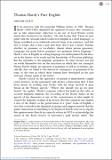Files in this item
Thomas Hardy's pure English
Item metadata
| dc.contributor.author | Tate, Gregory | |
| dc.date.accessioned | 2022-09-23T15:30:03Z | |
| dc.date.available | 2022-09-23T15:30:03Z | |
| dc.date.issued | 2022-09-16 | |
| dc.identifier | 273171166 | |
| dc.identifier | 2abf2564-dd30-4a05-8f38-977124df8d62 | |
| dc.identifier | 000854206900006 | |
| dc.identifier | 85139610347 | |
| dc.identifier.citation | Tate , G 2022 , ' Thomas Hardy's pure English ' , Victorian Literature and Culture , vol. 50 , no. 3 , pp. 521-547 . https://doi.org/10.1017/S1060150321000061 | en |
| dc.identifier.issn | 1060-1503 | |
| dc.identifier.other | ORCID: /0000-0002-5930-8187/work/119628643 | |
| dc.identifier.uri | https://hdl.handle.net/10023/26067 | |
| dc.description.abstract | This article examines Thomas Hardy's conflicting responses to late-Victorian debates about grammatical prescriptivism and linguistic purism. While Hardy claimed that “purism, whether in grammar or vocabulary, almost always means ignorance,” he also frequently expressed his interest in the (perhaps unrealizable) ideal of a “pure English” founded on fixed and unequivocal grammatical rules. Focusing on Tess of the d'Urbervilles, a novel subtitled “A Pure Woman,” I argue that this ambivalence informed the grammar of Hardy's prose style in his fiction. In this novel, Hardy employs the ambiguous modality of the English language, the imprecise grammatical distinction between the indicative statement of facts and the subjunctive elaboration of conceptions and hypotheses, both to sustain and to interrogate the binary of the real and the ideal that underpins his simultaneous critique and defense of the notion of “purity.” This use of modality highlights an analogy between Hardy's views on moral and linguistic purity: in each case, he rejects narrow estimations of purity, while nonetheless championing an ideal—of “pure English” and the “pure woman”—that transcends the limited perspectives of conventional purisms. | |
| dc.format.extent | 313363 | |
| dc.language.iso | eng | |
| dc.relation.ispartof | Victorian Literature and Culture | en |
| dc.subject | Thomas Hardy | en |
| dc.subject | Victorian novel | en |
| dc.subject | Historical linguistics | en |
| dc.subject | English grammar | en |
| dc.subject | PE English | en |
| dc.subject | T-NDAS | en |
| dc.subject.lcc | PE | en |
| dc.title | Thomas Hardy's pure English | en |
| dc.type | Journal article | en |
| dc.contributor.institution | University of St Andrews. School of English | en |
| dc.identifier.doi | https://doi.org/10.1017/S1060150321000061 | |
| dc.description.status | Peer reviewed | en |
This item appears in the following Collection(s)
Items in the St Andrews Research Repository are protected by copyright, with all rights reserved, unless otherwise indicated.

